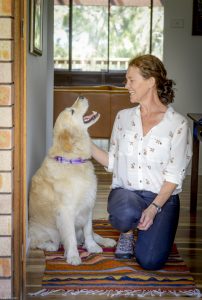
Dr. Glynis Kuipers is an experienced vet and animal carer, living and working on the South Coast of New South Wales.
Itchiness is caused by a response from the immune system to a bite, an allergen (a pollen, dust mite, plant etc) that the dog is allergic to or a particular skin disease that makes the skin dry or infected and therefore itchy.
Using the wrong shampoo on your dog or washing your dog too often may also cause mild itchiness. The pH of a dog’s skin is different from humans; you should not use human shampoo on dogs (not even baby shampoo). Some medicated shampoos are great for infections but they are not necessarily great for the skin and overuse or incorrect use can cause the skin to dry out and become itchy.
Fleas are a major cause of itchiness. A single flea can cause a dog to scratch for days and make the skin above his tail bald and irritated. Fleas affect every dog differently, some are actually allergic to the flea’s saliva when it bites and get incredibly itchy. Others can have a heavy flea burden and not even seem to notice. Other insects like mosquitos, ants and mites can also cause itchiness and dermatitis.
Environment allergies are divided into contact allergies and atopy. Contact allergies occur when to skin contacts a plant or chemical that it is allergic too and it causes a reaction at that location. They will usually be on the feet, the hairless lower belly or around the face. Atopy is a systemic allergic reaction to air borne particles like dust, pollen and mites that contact the skin and cause a reaction in particular areas of the skin, especially, the ears, the armpits, the back of the lower legs and lower belly skin. This disease is very common but difficult to diagnose. The only true way to diagnose atopic dermatitis is by skin allergy tests done by a veterinary dermatologist. Tiny amounts of a selection of pollens and dust mites etc are injected under the skin of the dog to see which he reacts to.
Whatever causes a dog to itch, once the itch becomes continuous; it is really likely that the skin will develop a secondary infection with bacteria and or yeast. These infections are also itchy make the dog even more uncomfortable.
The treatment of choice for an itchy dog is
1. Rule out fleas as a cause by giving the dog and any other animals in the environment a good flea treatment.
2. Have the skin checked for any secondary bacterial or yeast infection or any underlying skin disease like mites. Looking at skin samples under the microscope does this.
3. If environment allergens are thought to be causing the problems, the dog can be referred to a veterinary dermatologist for skin allergy tests and a vaccine to try to cure the disease or the dog can be treated with drugs to reduce the allergic reactions and therefore the itchiness so it is more comfortable (less itchy and less likely to develop an infection).
4. Adjunctive treatments to relieve itchiness can also be used, like soothing oatmeal shampoos and conditions, extra omega 3 and omega 6 fatty acids in the diet, and moisturisers applied directly to the skin.